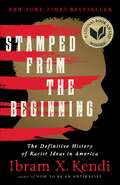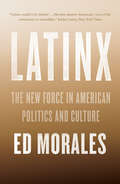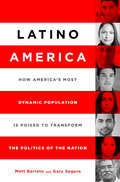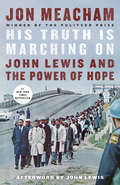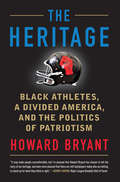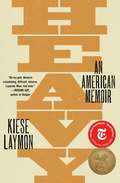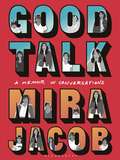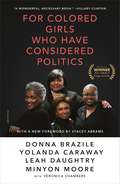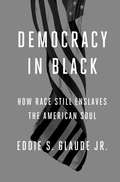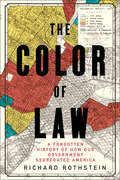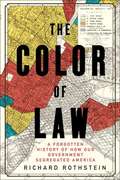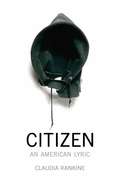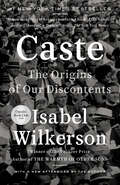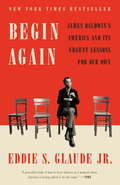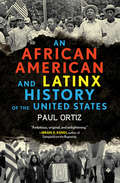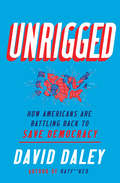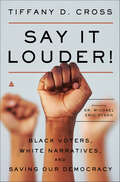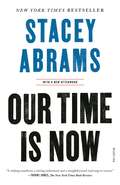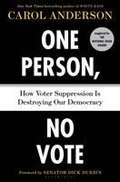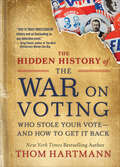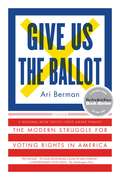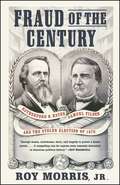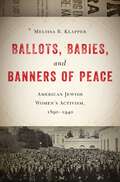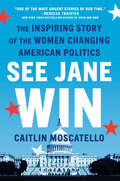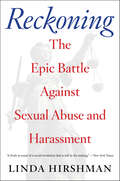Special Collections
NYPL's 2020 Election Reading List
Description: The books on this list cover voting issues including healthcare, education, climate change, and foreign policy, and explore subjects including political polarization, the media, and movements toward greater justice and equity.
- Table View
- List View
Stamped From the Beginning
by Ibram X. KendiSome Americans cling desperately to the myth that we are living in a post-racial society, that the election of the first Black president spelled the doom of racism. In fact, racist thought is alive and well in America--more sophisticated and more insidious than ever. And as award-winning historian Ibram X. Kendi argues in Stamped from the Beginning, if we have any hope of grappling with this stark reality, we must first understand how racist ideas were developed, disseminated, and enshrined in American society.
In this deeply researched and fast-moving narrative, Kendi chronicles the entire story of anti-Black racist ideas and their staggering power over the course of American history. Stamped from the Beginning uses the life stories of five major American intellectuals to offer a window into the contentious debates between assimilationists and segregationists and between racists and anti racists. From Puritan minister Cotton Mather to Thomas Jefferson, from fiery abolitionist William Lloyd Garrison to brilliant scholar W.E.B. Du Bois to legendary anti-prison activist Angela Davis, Kendi shows how and why some of our leading proslavery and pro-civil rights thinkers have challenged or helped cement racist ideas in America.
Contrary to popular conceptions, racist ideas did not arise from ignorance or hatred. Instead, they were devised and honed by some of the most brilliant minds of each era. These intellectuals used their brilliance to justify and rationalize deeply entrenched discriminatory policies and the nation's racial disparities in everything from wealth to health. And while racist ideas are easily produced and easily consumed, they can also be discredited. In shedding much-needed light on the murky history of racist ideas, Stamped from the Beginning offers us the tools we need to expose them--and in the process, gives us reason to hope.
Winner of the National Book Award
A New York Times Bestseller
Latinx
by Ed MoralesThe Latinx revolution in US culture, society, and politics“Latinx” (pronounced “La-teen-ex”) is the gender-neutral term that covers one of the largest and fastest growing minorities in the United States, accounting for 17 percent of the country. Over 58 million Americans belong to the category, including a sizable part of the country’s working class, both foreign and native-born. Their political empowerment is altering the balance of forces in a growing number of states. And yet Latinx barely figure in America’s ongoing conversation about race and ethnicity. Remarkably, the US census does not even have a racial category for “Latino.”In this groundbreaking discussion, Ed Morales explains how Latinx political identities are tied to a long Latin American history of mestizaje—“mixedness” or “hybridity”—and that this border thinking is both a key to understanding bilingual, bicultural Latin cultures and politics and a challenge to America’s infamously black–white racial regime. This searching and long-overdue exploration of the meaning of race in American life reimagines Cornel West’s bestselling Race Matters with a unique Latinx inflection.
Latino America
by Gary M. Segura and Matt BarretoSometime in April 2014, somewhere in a hospital in California, a Latino child tipped the demographic scales as Latinos displaced non-Hispanic whites as the largest racial/ethnic group in the state. So, one-hundred-sixty-six years after the Treaty of Guadalupe Hidalgo brought the Mexican province of Alta California into the United States, Latinos once again became the largest population in the state. Surprised? Texas will make the same transition sometime before 2020.When that happens, America's two most populous states, carrying the largest number of Electoral College votes, will be Latino. New Mexico is already there. New York, Florida, Arizona, and Nevada are shifting rapidly. Latino populations since 2000 have doubled in Alabama, Arkansas, Georgia, and South Dakota. The US is undergoing a substantial and irreversible shift in its identity.So, too, are the Latinos who make up these populations. Matt Barreto and Gary M. Segura are the country's preeminent experts in the shape, disposition, and mood of Latino America. They show the extent to which Latinos have already transformed the US politically and socially, and how Latino Americans are the most buoyant and dynamic ethnic and racial group, often in quite counterintuitive ways. Latinos' optimism, strength of family, belief in the constructive role of government, and resilience have the imminent potential to reshape the political and partisan landscape for a generation and drive the outcome of elections as soon as 2016.
His Truth Is Marching On
by Jon MeachamAn intimate and revealing portrait of civil rights icon and longtime U.S. congressman John Lewis, linking his life to the painful quest for justice in America from the 1950s to the present—from the Pulitzer Prize–winning author of The Soul of America
John Lewis, who at age twenty-five marched in Selma, Alabama, and was beaten on the Edmund Pettus Bridge, was a visionary and a man of faith. Drawing on decades of wide-ranging interviews with Lewis, Jon Meacham writes of how this great-grandson of a slave and son of an Alabama tenant farmer was inspired by the Bible and his teachers in nonviolence, Reverend James Lawson and Martin Luther King, Jr., to put his life on the line in the service of what Abraham Lincoln called “the better angels of our nature.”
From an early age, Lewis learned that nonviolence was not only a tactic but a philosophy, a biblical imperative, and a transforming reality. At the age of four, Lewis, ambitious to become a minister, practiced by preaching to his family’s chickens. When his mother cooked one of the chickens, the boy refused to eat it—his first act, he wryly recalled, of nonviolent protest. Integral to Lewis’s commitment to bettering the nation was his faith in humanity and in God—and an unshakable belief in the power of hope.
Meacham calls Lewis “as important to the founding of a modern and multiethnic twentieth- and twenty-first-century America as Thomas Jefferson and James Madison and Samuel Adams were to the initial creation of the Republic itself in the eighteenth century.” A believer in the injunction that one should love one's neighbor as oneself, Lewis was arguably a saint in our time, risking limb and life to bear witness for the powerless in the face of the powerful. In many ways he brought a still-evolving nation closer to realizing its ideals, and his story offers inspiration and illumination for Americans today who are working for social and political change.
A New York Times Bestseller
The Heritage
by Howard BryantFollowing in the footsteps of Robeson, Ali, Robinson and others, today's Black athletes re-engage with social issues and the meaning of American patriotism
It used to be that politics and sports were as separate from one another as church and state. The ballfield was an escape from the world's worst problems, top athletes were treated like heroes, and cheering for the home team was as easy and innocent as hot dogs and beer. “No news on the sports page” was a governing principle in newsrooms.
That was then.
Today, sports arenas have been transformed into staging grounds for American patriotism and the hero worship of law enforcement. Teams wear camouflage jerseys to honor those who serve; police officers throw out first pitches; soldiers surprise their families with homecomings at halftime.
Sports and politics are decidedly entwined.But as journalist Howard Bryant reveals, this has always been more complicated for black athletes, who from the start, were committing a political act simply by being on the field. In fact, among all black employees in twentieth-century America, perhaps no other group had more outsized influence and power than ballplayers. The immense social responsibilities that came with the role is part of the black athletic heritage.
It is a heritage built by the influence of the superstardom and radical politics of Paul Robeson, Jackie Robinson, Muhammad Ali, Tommie Smith, and John Carlos through the 1960s; undermined by apolitical, corporate-friendly “transcenders of race,” O. J. Simpson, Michael Jordan, and Tiger Woods in the following decades; and reclaimed today by the likes of LeBron James, Colin Kaepernick, and Carmelo Anthony.The Heritage is the story of the rise, fall, and fervent return of the athlete-activist.
Through deep research and interviews with some of sports' best-known stars—including Kaepernick, David Ortiz, Charles Barkley, and Chris Webber—as well as members of law enforcement and the military, Bryant details the collision of post-9/11 sports in America and the politically engaged post-Ferguson black athlete.
Heavy
by Kiese LaymonIn this powerful and provocative memoir, genre-bending essayist and novelist Kiese Laymon explores what the weight of a lifetime of secrets, lies, and deception does to a black body, a black family, and a nation teetering on the brink of moral collapse.
Kiese Laymon is a fearless writer. In his essays, personal stories combine with piercing intellect to reflect both on the state of American society and on his experiences with abuse, which conjure conflicted feelings of shame, joy, confusion and humiliation. Laymon invites us to consider the consequences of growing up in a nation wholly obsessed with progress yet wholly disinterested in the messy work of reckoning with where we’ve been. In Heavy, Laymon writes eloquently and honestly about growing up a hard-headed black son to a complicated and brilliant black mother in Jackson, Mississippi.
From his early experiences of sexual violence, to his suspension from college, to his trek to New York as a young college professor, Laymon charts his complex relationship with his mother, grandmother, anorexia, obesity, sex, writing, and ultimately gambling. By attempting to name secrets and lies he and his mother spent a lifetime avoiding, Laymon asks himself, his mother, his nation, and us to confront the terrifying possibility that few in this nation actually know how to responsibly love, and even fewer want to live under the weight of actually becoming free.
A personal narrative that illuminates national failures, Heavy is defiant yet vulnerable, an insightful, often comical exploration of weight, identity, art, friendship, and family that begins with a confusing childhood—and continues through twenty-five years of haunting implosions and long reverberations.
Winner of the 2018 Andrew Carnegie Medal for Non-Fiction
Good Talk
by Mira Jacob'By turns hilarious and heart-rending. Plunges fearlessly into the murky grey areas of race and family, of struggling to find common ground, of trying to talk to our children and help them make sense of it all' Celeste Ng'Does Donald Trump hate Muslims?''Is that how people really walk on the moon?''Is it bad to be brown?''Are white people afraid of brown people?'Inspired by her viral BuzzFeed piece '37 Difficult Questions from My Mixed-Raced Son', Mira Jacob responds to: her six-year-old, Zakir, who asks if the new president hates brown boys like him; uncomfortable relationship advice from her parents, who came to the United States from India one month into their arranged marriage; and increasingly fraught exchanges with her Trump-supporting in-laws. Jacob also investigates her own past, including how it felt to be a brown-skinned New Yorker on 9/11. As earnest and moving as they are laugh-out-loud funny, these are the stories that have shaped one life, but will resonate with many others.
For Colored Girls Who Have Considered Politics
by Veronica Chambers and Donna Brazile and Yolanda Caraway and Leah Daughtry and Minyon MooreThe four most powerful African American women in politics share the story of their friendship and how it has changed politics in America.The lives of black women in American politics are remarkably absent from the shelves of bookstores and libraries. For Colored Girls Who Have Considered Politics is a sweeping view of American history from the vantage points of four women who have lived and worked behind the scenes in politics for over thirty years—Donna Brazile, Yolanda Caraway, Leah Daughtry, and Minyon Moore—a group of women who call themselves The Colored Girls. Like many people who have spent their careers in public service, they view their lives in four-year waves where presidential campaigns and elections have been common threads. For most of the Colored Girls, their story starts with Jesse Jackson’s first campaign for president. From there, they went on to work on the presidential campaigns of Walter Mondale, Michael Dukakis, Bill Clinton, Al Gore, Barack Obama and Hillary Rodham Clinton. Over the years, they’ve filled many roles: in the corporate world, on campaigns, in unions, in churches, in their own businesses and in the White House. Through all of this, they’ve worked with those who have shaped our country’s history—US Presidents such as Bill Clinton and Barack Obama, well-known political figures such as Terry McAuliffe and Howard Dean, and legendary activists and historical figures such as Jesse Jackson, Coretta Scott King, and Betty Shabazz. For Colored Girls Who Have Considered Politics is filled with personal stories that bring to life heroic figures we all know and introduce us to some of those who’ve worked behind the scenes but are still hidden. Whatever their perch, the Colored Girls are always focused on the larger goal of “hurrying history” so that every American — regardless of race, gender or religious background — can have a seat at the table. This is their story.
Democracy in Black
by Eddie S. Glaude Jr.A powerful polemic on the state of black America that savages the idea of a post-racial society America's great promise of equality has always rung hollow in the ears of African Americans. But today the situation has grown even more dire. From the murders of black youth by the police, to the dismantling of the Voting Rights Act, to the disaster visited upon poor and middle-class black families by the Great Recession, it is clear that black America faces an emergency--at the very moment the election of the first black president has prompted many to believe we've solved America's race problem. Democracy in Black is Eddie S. Glaude Jr.'s impassioned response. Part manifesto, part history, part memoir, it argues that we live in a country founded on a "value gap"--with white lives valued more than others--that still distorts our politics today. Whether discussing why all Americans have racial habits that reinforce inequality, why black politics based on the civil-rights era have reached a dead end, or why only remaking democracy from the ground up can bring real change, Glaude crystallizes the untenable position of black America--and offers thoughts on a better way forward. Forceful in ideas and unsettling in its candor, Democracy In Black is a landmark book on race in America, one that promises to spark wide discussion as we move toward the end of our first black presidency.From the Hardcover edition.
The Color of Law
by Richard RothsteinWidely heralded as a “masterful” (Washington Post) and “essential” (Slate) history of the modern American metropolis, Richard Rothstein’s The Color of Law offers “the most forceful argument ever published on how federal, state, and local governments gave rise to and reinforced neighborhood segregation” (William Julius Wilson).
Exploding the myth of de facto segregation arising from private prejudice or the unintended consequences of economic forces, Rothstein describes how the American government systematically imposed residential segregation: with undisguised racial zoning; public housing that purposefully segregated previously mixed communities; subsidies for builders to create whites-only suburbs; tax exemptions for institutions that enforced segregation; and support for violent resistance to African Americans in white neighborhoods.
A groundbreaking, “virtually indispensable” study that has already transformed our understanding of twentieth-century urban history (Chicago Daily Observer), The Color of Law forces us to face the obligation to remedy our unconstitutional past.
A New York Times Bestseller
The Color Of Law
by Richard RothsteinIn this groundbreaking history of the modern American metropolis, Richard Rothstein, a leading authority on housing policy, explodes the myth that America's cities came to be racially divided through de facto segregation--that is, through individual prejudices, income differences, or the actions of private institutions like banks and real estate agencies. Rather, The Color of Law incontrovertibly makes clear that it was de jure segregation--the laws and policy decisions passed by local, state, and federal governments--that actually promoted the discriminatory patterns that continue to this day. Through extraordinary revelations and extensive research that Ta-Nehisi Coates has lauded as "brilliant" (The Atlantic), Rothstein comes to chronicle nothing less than an untold story that begins in the 1920s, showing how this process of de jure segregation began with explicit racial zoning, as millions of African Americans moved in a great historical migration from the south to the north. As Jane Jacobs established in her classic The Death and Life of Great American Cities, it was the deeply flawed urban planning of the 1950s that created many of the impoverished neighborhoods we know. Now, Rothstein expands our understanding of this history, showing how government policies led to the creation of officially segregated public housing and the demolition of previously integrated neighborhoods. While urban areas rapidly deteriorated, the great American suburbanization of the post-World War II years was spurred on by federal subsidies for builders on the condition that no homes be sold to African Americans. Finally, Rothstein shows how police and prosecutors brutally upheld these standards by supporting violent resistance to black families in white neighborhoods. The Fair Housing Act of 1968 prohibited future discrimination but did nothing to reverse residential patterns that had become deeply embedded. Yet recent outbursts of violence in cities like Baltimore, Ferguson, and Minneapolis show us precisely how the legacy of these earlier eras contributes to persistent racial unrest. "The American landscape will never look the same to readers of this important book" (Sherrilyn Ifill, president of the NAACP Legal Defense Fund), as Rothstein's invaluable examination shows that only by relearning this history can we finally pave the way for the nation to remedy its unconstitutional past.
Citizen
by Claudia RankineA provocative meditation on race, Claudia Rankine’s long-awaited follow up to her groundbreaking book Don’t Let Me Be Lonely: An American Lyric
Claudia Rankine’s bold new book recounts mounting racial aggressions in ongoing encounters in twenty-first-century daily life and in the media. Some of these encounters are slights, seeming slips of the tongue, and some are intentional offensives in the classroom, at the supermarket, at home, on the tennis court with Serena Williams and the soccer field with Zinedine Zidane, online, on TV—everywhere, all the time. The accumulative stresses come to bear on a person’s ability to speak, perform, and stay alive. Our addressability is tied to the state of our belonging, Rankine argues, as are our assumptions and expectations of citizenship. In essay, image, and poetry, Citizen is a powerful testament to the individual and collective effects of racism in our contemporary, often named “post-race” society.
Caste
by Isabel WilkersonIn this brilliant book, Isabel Wilkerson gives us a masterful portrait of an unseen phenomenon in America as she explores, through an immersive, deeply researched narrative and stories about real people, how America today and throughout its history has been shaped by a hidden caste system, a rigid hierarchy of human rankings.
Beyond race, class, or other factors, there is a powerful caste system that influences people’s lives and behavior and the nation’s fate. Linking the caste systems of America, India, and Nazi Germany, Wilkerson explores eight pillars that underlie caste systems across civilizations, including divine will, bloodlines, stigma, and more. Using riveting stories about people—including Martin Luther King, Jr., baseball’s Satchel Paige, a single father and his toddler son, Wilkerson herself, and many others—she shows the ways that the insidious undertow of caste is experienced every day. She documents how the Nazis studied the racial systems in America to plan their out-cast of the Jews; she discusses why the cruel logic of caste requires that there be a bottom rung for those in the middle to measure themselves against; she writes about the surprising health costs of caste, in depression and life expectancy, and the effects of this hierarchy on our culture and politics. Finally, she points forward to ways America can move beyond the artificial and destructive separations of human divisions, toward hope in our common humanity.
Beautifully written, original, and revealing, Caste: The Origins of Our Discontents is an eye-opening story of people and history, and a reexamination of what lies under the surface of ordinary lives and of American life today.
A New York Times bestseller
Begin Again
by Eddie S. GlaudeJames Baldwin grew disillusioned by the failure of the civil rights movement to force America to confront its lies about race. In our own moment, when that confrontation feels more urgently needed than ever, what can we learn from his struggle?
We live, according to Eddie S. Glaude Jr., in a moment when the struggles of Black Lives Matter and the attempt to achieve a new America have been challenged by the election of Donald Trump, a president whose victory represents yet another failure of America to face the lies it tells itself about race. From Charlottesville to the policies of child separation at the border, his administration turned its back on the promise of Obama’s presidency and refused to embrace a vision of the country shorn of the insidious belief that white people matter more than others.
We have been here before: For James Baldwin, these after times came in the wake of the civil rights movement, when a similar attempt to compel a national confrontation with the truth was answered with the murders of Medgar Evers, Malcolm X, and Martin Luther King, Jr. In these years, spanning from the publication of The Fire Next Time in 1963 to that of No Name in the Street in 1972, Baldwin transformed into a more overtly political writer, a change that came at great professional and personal cost. But from that journey, Baldwin emerged with a sense of renewed purpose about the necessity of pushing forward in the face of disillusionment and despair.
In the story of Baldwin’s crucible, Glaude suggests, we can find hope and guidance through our own after times, this Trumpian era of shattered promises and white retrenchment. Mixing biography—drawn partially from newly uncovered interviews—with history, memoir, and trenchant analysis of our current moment, Begin Again is Glaude&’s endeavor, following Baldwin, to bear witness to the difficult truth of race in America today. It is at once a searing exploration that lays bare the tangled web of race, trauma, and memory, and a powerful interrogation of what we all must ask of ourselves in order to call forth a new America.
A New York Times Bestseller
An African American and Latinx History of the United States
by Paul OrtizAn intersectional history of the shared struggle for African American and Latinx civil rightsSpanning more than two hundred years, An African American and Latinx History of the United States is a revolutionary, politically charged narrative history arguing that the “Global South” was crucial to the development of America as we know it. Ortiz challenges the notion of westward progress, as exalted by widely taught formulations such as “manifest destiny” and “Jacksonian democracy,” and shows how placing African American, Latinx, and Indigenous voices unapologetically front and center transforms American history into the story of the working class organizing against imperialism.In precise detail, Ortiz traces this untold history from the Jim Crow-esque racial segregation of the Southwest, the rise and violent fall of a powerful tradition of Mexican labor organizing in the twentieth century, to May 1, 2006, International Workers’ Day, when migrant laborers—Chicana/os, Afro-Cubanos, and immigrants from nearly every continent on earth—united in resistance on the first “Day Without Immigrants.”Incisive and timely, An African American and Latinx History of the United States is a bottom-up history told from the viewpoint of African American and Latinx activists and revealing the radically different ways people of the diaspora addressed issues still plaguing the United States today.
Unrigged
by David DaleyA revelatory account by the best- selling author of Ratf**ked that will give you hope that America’s fragile democracy can still be saved. Following Ratf**ked, his “extraordinary timely and undeniably important” (New York Times Book Review) exposé of how a small cadre of Republican operatives rigged American elections, David Daley emerged as one of the nation’s leading authorities on gerrymandering. In Unrigged, he charts a vibrant political movement that is rising in the wake of his and other reporters’ revelations. With his trademark journalistic rigor and narrative flair, Daley reports on Pennsylvania’s dramatic defeat of a gerrymander using the research of ingenious mathematicians and the Michigan millennial who launched a statewide redistricting revolution with a Facebook post. He tells the stories of activist groups that paved the way for 2018’s historic blue wave and won crucial battles for voting rights in Florida, Maine, Utah, and nationwide. In an age of polarization, Unrigged offers a vivid portrait of a nation transformed by a new civic awakening, and provides a blueprint for what must be done to keep American democracy afloat.
Say It Louder!
by Tiffany CrossA breakout media and political analyst delivers a sweeping snapshot of American Democracy and the role that African Americans have played in its shaping while offering concrete information to help harness the electoral power of the country’s rising majority and exposing political forces aligned to subvert and suppress Black voters.Black voters were critical to the Democrats’ 2018 blue wave. In fact, 90 percent of Black voters supported Democratic House candidates, compared to just 53 percent of all voters. Despite media narratives, this was not a fluke. Throughout U.S. history, Black people have played a crucial role in the shaping of the American experiment. Yet still, this powerful voting bloc is often dismissed as some “amorphous” deviation, argues Tiffany Cross.Say It Louder! is her explosive examination of how America’s composition was designed to exclude Black voters, but paradoxically would likely cease to exist without them. With multiple tentacles stretching into the cable news echo chamber, campaign leadership, and Black voter data, Cross creates a wrinkle in time with a reflective look at the timeless efforts endlessly attempting to deny people of color the right to vote—a basic tenet of American democracy. And yet as the demographics of the country are changing, so too is the electoral power construct—by evolution and by force, Cross declares. Grounded in the most-up-to-date research, Say It Louder! is a vital tool for a wide swath of constituencies.
Our Time Is Now
by Stacey AbramsNEW YORK TIMES BESTSELLER"With each page, she inspires and empowers us to create systems that reflect a world in which all voices are heard and all people believe and feel that they matter." —Kerry Washington "This is a narrative that describes the urgency that compels me and millions more to push for a different American story than the one being told today. It's a story that is one part danger, one part action, and all true. It's a story about how and why we fight for our democracy and win." —Stacey Abrams Celebrated national leader and bestselling author Stacey Abrams offers a blueprint to end voter suppression, empower our citizens, and take back our country. A recognized expert on fair voting and civic engagement, Abrams chronicles a chilling account of how the right to vote and the principle of democracy have been and continue to be under attack. Abrams would have been the first African American woman governor, but experienced these effects firsthand, despite running the most innovative race in modern politics as the Democratic nominee in Georgia. Abrams didn’t win, but she has not conceded. The book compellingly argues for the importance of robust voter protections, an elevation of identity politics, engagement in the census, and a return to moral international leadership. Our Time Is Now draws on extensive research from national organizations and renowned scholars, as well as anecdotes from her life and others’ who have fought throughout our country’s history for the power to be heard. The stakes could not be higher. Here are concrete solutions and inspiration to stand up for who we are—now.
One Person, No Vote
by Carol AndersonIn her New York Times bestseller White Rage, Carol Anderson laid bare an insidious history of policies that have systematically impeded black progress in America, from 1865 to our combustible present. With One Person, No Vote, she chronicles a related history: the rollbacks to African American participation in the vote since the 2013 Supreme Court decision that eviscerated the Voting Rights Act of 1965. Known as the Shelby ruling, this decision effectively allowed districts with a demonstrated history of racial discrimination to change voting requirements without approval from the Department of Justice.
Focusing on the aftermath of Shelby, Anderson follows the astonishing story of government-dictated racial discrimination unfolding before our very eyes as more and more states adopt voter suppression laws. In gripping, enlightening detail she explains how voter suppression works, from photo ID requirements to gerrymandering to poll closures. In a powerful new afterword, she examines the repercussions of the 2018 midterm elections. And with vivid characters, she explores the resistance: the organizing, activism, and court battles to restore the basic right to vote to all Americans.
The Hidden History of the War on Voting
by Thom Hartmann"Hartmann's history of voter suppression in America is necessary information given current news about voter registration purges and redistricting...a particularly timely topic for an election year, and anyone who is seriously concerned about the survival of American democracy will want to read this book and apply its lessons."—BooklistAmerica's #1 progressive radio host looks at how elites have long tried to disenfranchise citizens—particularly people of color, women, and the poor—and shows what we can do to ensure everyone has a voice in this democracy.In today's America, only a slim majority of people register to vote, and a large percentage of registered voters don't bother to show up: Donald Trump was elected by only 26 percent of eligible voters. Unfortunately, this is not a bug in our system, it's a feature. Thom Hartmann unveils the strategies and tactics that conservative elites in this country have used, from the foundation of the Electoral College to the latest voter ID laws, to protect their interests by preventing &“the wrong people&”—such as the poor, women, and people of color—from voting while making it more convenient for the wealthy and white. But he also lays out a wide variety of simple, commonsense ways that we the people can fight back and reclaim our right to rule through the ballot box.
Give Us The Ballot
by Ari BermanCountless books have been written about the civil rights movement, but far less attention has been paid to what happened after the dramatic passage of the Voting Rights Act in 1965 and the turbulent forces it unleashed. In this groundbreaking narrative history, Ari Berman charts both the transformation of American democracy under the VRA and the counterrevolution that has sought to limit it from the moment the act was signed into law. The VRA is widely regarded as the crowning achievement of the civil rights movement, and yet―more than fifty years later―the battles over race, representation, and political power continue, as lawmakers devise new strategies to keep minorities out of the voting booth, while the Supreme Court has declared a key part of the Voting Rights Act unconstitutional.
Through meticulous research, in-depth interviews, and incisive on-the-ground reporting, Give Us the Ballot offers the first comprehensive history of its kind, and provides new insight into one of the most vital political and civil rights issues of our time.
Fraud of the Century
by Roy Morris Jr.The bitter 1876 contest between Ohio Republican Governor Rutherford B. Hayes and New York Democratic Governor Samuel Tilden was the most sensational and corrupt presidential election in American history. It was also, in many ways, the final battle of the Civil War. Although Tilden received some 265,000 more popular votes than his opponent, and needed only one more electoral vote for victory, contested returns in three southern states still under Republican-controlled Reconstruction governments ultimately led to Hayes's being declared the winner after four tense months of brazen political intrigue and threats of violence that brought armed troops into the streets of the nation's capital. In this major work of popular history and scholarship, Roy Morris, Jr., takes readers to Philadelphia in America's centennial year, where millions celebrated the nation's industrial might and democratic ideals; to the nation's heartland, where Republicans refought the Civil War by waging a cynical "bloody shirt" campaign to tar the Democrats as the party of disunion and rebellion; and finally into the smoke-filled back rooms of Washington, D.C., where the will of the people was thwarted and the newly won rights of four million former slaves were ignored, leading to nearly ninety years of legalized segregation in the South.
Ballots, Babies, and Banners of Peace
by Melissa R. KlapperWinner of the 2013 National Jewish Book Award, Women's Studies Ballots, Babies, and Banners of Peace explores the social and political activism of American Jewish women from approximately 1890 to the beginnings of World War II. Written in an engaging style, the book demonstrates that no history of the birth control, suffrage, or peace movements in the United States is complete without analyzing the impact of Jewish women's presence. The volume is based on years of extensive primary source research in more than a dozen archives and among hundreds of primary sources, many of which have previously never been seen. Voluminous personal papers and institutional records paint a vivid picture of a world in which both middle-class and working-class American Jewish women were consistently and publicly engaged in all the major issues of their day and worked closely with their non-Jewish counterparts on behalf of activist causes. This extraordinarily well researched volume makes a unique contribution to the study of modern women's history, modern Jewish history, and the history of American social movements. Instructor's Guide
See Jane Win
by Caitlin MoscatelloFrom an award-winning journalist covering gender and politics comes an inside look at the female candidates fighting back and winning elections in the crucial 2018 midterms. After November 8, 2016, first came the sadness; then came the rage, the activism, and the protests; and, finally, for thousands of women, the next step was to run for office—many of them for the first time. More women campaigned for local or national office in the 2018 election cycle than at any other time in US history, challenging accepted notions about who seeks power and who gets it. Journalist Caitlin Moscatello reported on this wave of female candidates for New York magazine’s The Cut, Glamour, and Elle. And in See Jane Win, she further documents this pivotal time in women’s history. Closely following four candidates throughout the entire process, from the decision to run through Election Day, See Jane Win takes readers inside their exciting, winning campaigns and the sometimes thrilling, sometimes brutal realities of running for office while female. MEET THE CANDIDATES: Abigail Spanberger, a mom of three young girls and a former CIA operative, running for Congress in Virginia to unseat Freedom Caucus member Dave Brat. Catalina Cruz, a Colombian-born attorney whose state assembly bid could make her the first Dreamer elected in New York and only the third in the country. Anna Eskamani, an Iranian-American woman running for state office in Florida, with a campaign motivated by her mother’s health-care struggles and the Pulse Nightclub shootings. London Lamar, a Memphis native looking to become the youngest female representative in the Tennessee state house, running in one of the only Democratic and Black-majority areas of a largely conservative state. Beyond the 2018 victories, Moscatello speaks with researchers, strategists, and the leaders of organizations that helped women win. What she discovers is that the candidates who triumphed in 2018 emphasized authenticity and passion instead of conforming to the stereotype of what a candidate should look or sound like, a formula that will be more relevant than ever as we approach the 2020 presidential election.
Reckoning
by Linda HirshmanThe first history—incisive, witty, fascinating—of the fight against sexual harassment, from the author of the New York Times bestseller Sisters in LawLinda Hirshman, acclaimed historian of social movements, delivers the sweeping story of the struggle leading up to #MeToo and beyond: from the first tales of workplace harassment percolating to the surface in the 1970s to the Clinton/Lewinsky scandal—when liberal women largely forgave Clinton, giving men a free pass for two decades. Many liberals even resisted the movement to end rape on campus. And yet, legal, political, and cultural efforts, often spearheaded by women of color, were quietly paving the way for the takedown of abusers and harassers. Reckoning delivers the stirring tale of a movement catching fire as pioneering women in the media exposed the Harvey Weinsteins of the world, women flooded the political landscape, and the walls of male privilege finally began to crack. This is revelatory, essential social history.
